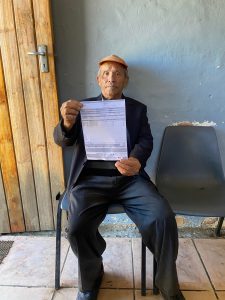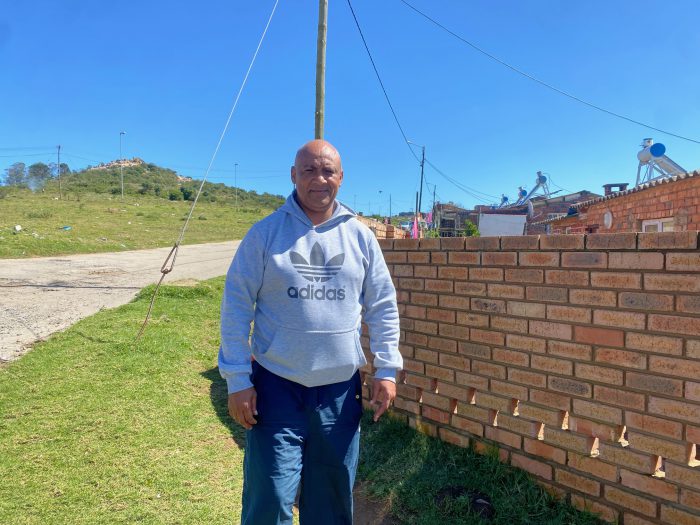By Selenathi Botha
Several residents of Makhanda’s Ghost Town, including a 77-year-old pensioner, were abruptly disconnected from their pre-paid electricity recently after the council insisted that they repay municipal debts allegedly incurred by their now-deceased parents and grandparents.
The families were only reconnected 10 days later after community activists held several meetings with the municipality. Ghost Town activist Weston du Plessis, who represented the disconnected families, said that residents of the community had been facing the additional nightmare of having lengthy water cuts and barely any refuse removal – even though they are expected to pay monthly rates.
Ghost Town is made up of aging houses that were built by the Apartheid government. Du Plessis pointed out that he and his mother are living in his deceased grandmother’s house. The municipality says they are liable for a bill of R80 000 that he believes dates back to the 1990s when his grandmother was still alive.
“Now that my mother has taken over that house, she has to pay the debt. If not, they block the pre-paid electricity meter from working”, he said. ”We don’t mind paying rates but what people are asking for is a fair chance for people to pay [only]their own rates that they have acquired over a certain period, not historical debt that has cropped up”, he told Grocott’s Mail.
What also disturbs Weston is that he says the municipality charges arbitrary amounts of up to R5000 to unblock a pre-paid meter once they have blocked it. Affected residents then have to agree to a repayment plan. Du Plessis says the municipality does not negotiate repayment terms, but decides the amount on their own without knowing the income of the residents. He adds that many of the residents of Ghost Town are working in retail jobs where they earn only R6000 per month, and cannot afford to repay up to R3000 per month on outstanding rates.

Another affected Ghost Town resident is 77-year-old pensioner Nortie Jacobs. When Grocott’s Mail visited Jacobs at his home, his pre-paid electricity had been blocked by the municipality several days earlier after they said he owed them R76 000. Jacobs’ electricity meter was only unblocked last weekend. He sadly told this newspaper “Having our box blocked has affected our lives in a bad way because now everything lacks. We can’t cook or wash. Sometimes the water also comes on only after three days. We are really suffering”.
He added that when the municipality blocks pre-paid meters, the residents also lose whatever electricity they may have just loaded onto the meter. This is because even when the pre-paid meter is eventually unblocked, the electricity that it had is gone.
Yolanda Duiker and her family are another family who said they were not coping. Their pre-paid electricity meter was also blocked and they were told to pay R5800 to unblock their electricity plus an additional R2000 per month. Duiker said this is completely unaffordable for them as they have school fees to pay too. Her electricity was also only unblocked last weekend.
Du Plessis said the “deceased debt” problem had been going on for years and he’d had several meetings with the municipality. The best result he had managed to achieve was a promise from the municipality that if pensioners brought in proof that they had no income, the municipality would unblock their pre-paid meters, and make some kind of payment arrangement.
Grocott’s Mail spoke to Member of the Mayoral Committee (MMC) for Finance, ANC councillor Andile Hoyi, who said the municipality had been trying since April 2023 to collect outstanding debts from ratepayers so that it could pay back the huge amount it owed to Eskom.
“Service delivery is affected due to low revenue collecting, meaning that the projected plans/projects identified for this financial year could not be fully implemented due to poor payments of services consumed”, said Hoyi.
He added that between November 2022 and March 2023, Makana Municipality held an indigent campaign to identify all the residents who were dependent on social grants and could not afford to pay for municipal services. “All wards were visited and walk-ins were also considered”, said Hoyi. He added that the municipality also wrote off R68 million worth of debts in July 2022.
“Residents were also advised to come forward to be able to be assisted with the historical debt. Also, during door-to-door, campaign awareness was done. Notice will be issued to invite all residents affected by historical debt of deceased [people]to visit our offices for assistance,” Hoyi said.
But Ghost Town WhatsApp administrator and a member of the Grahamstown Civic, Igy Kofie, said the municipality’s behaviour was “unacceptable”.
“Our people are faced with various challenges in our communities. Besides poverty, unemployment, service delivery challenges, and crime, our people are now being forced to settle historical debt, or the electricity meters are being blocked by the municipality. This is unacceptable behavior by the municipality. We demand that those debts be written off and meters be unblocked” said Kofie.


